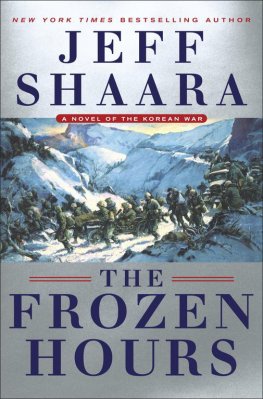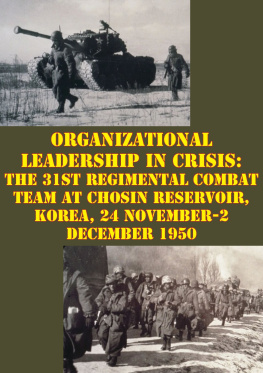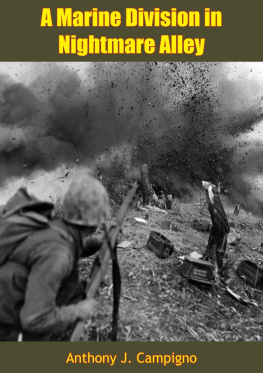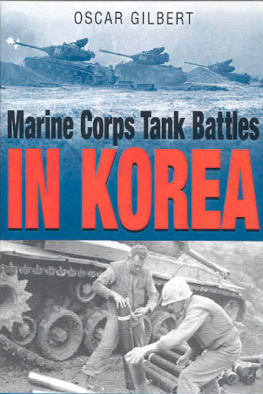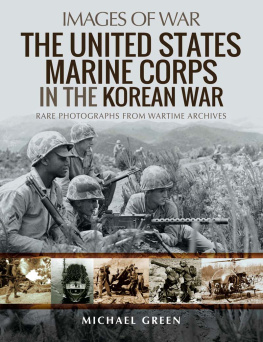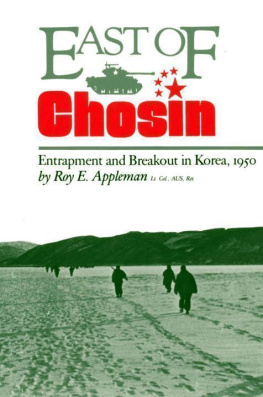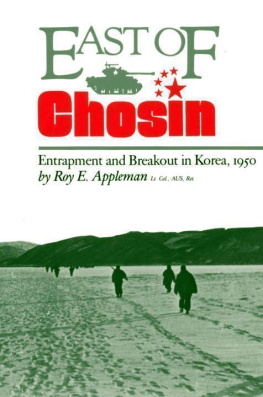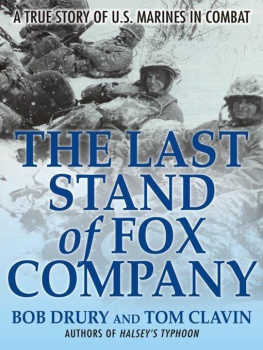COLDER THAN HELL
A MARINE RIFLE COMPANY
AT CHOSIN RESERVOIR
Colder
than
Hell
JOSEPH R. OWEN
FOREWORD BY GEN. RAYMOND G. DAVIS, USMC (RET.)

BLUEJACKET BOOKS
NAVAL INSTITUTE PRESS ANNAPOLIS, MARYLAND
This book has been brought to publication by the generous assistance of Marguerite and Gerry Lenfest.
Naval Institute Press
291 Wood Road
Annapolis, MD 21402
1996 by Joseph R. Owen
All rights reserved. No part of this book may be reproduced or utilized in any form or by any means, electronic or mechanical, including photocopying and recording, or by any information storage and retrieval system, without permission in writing from the publisher.
First Bluejacket Books printing, 2000
ISBN 978-1-61251-222-8
The Library of Congress has cataloged the hardcover edition as follows:
Owen, Joseph R.
Colder than hell : a Marine rifle company at Chosin Reservoir / Joseph R. Owen.
p. cm.
1. Korean War, 19501953CampaignsKorea (North)Changjin Reservoir. 2. Korean War, 19501953Regimental historiesUnited States. 3. United States. Marine Corps. Marines, 7th. Battalion, 1st. Baker-One-Seven (Company)History. 4. Korean War, 19501953Personal narratives, American. 5. Changjin Reservoir (Korea)History, Military. 6. Owen, Joseph R. I. Title.
DS918.2.C35096 1996
To Kelly, who rated a medal but never got it.
And Chew Een Lee, who rated more.
And Dorothy, the finest ever seen.
CONTENTS
FOREWORD
Twice in 1950, during the first months of the Korean War, the United States faced military catastrophe. Both situations occurred because of American errors of diplomacy and faulty intelligence, and because our military was not prepared to meet a determined enemy on the battlefield.
North Korea and China were the enemies that exploited our failings. On two occasions that year they caught us by surprise, launching massive attacks first against our ally, South Korea, and then against our own inadequate forces. Both times the consequences were devastating. There were tragic numbers of casualties in the ranks of our soldiers and Marines, and American prestige, worldwide, was severely impaired.
The surprise invasion of South Korea by North Koreawith the support of Communist China and the Soviet Unionwas virtually invited by the United States and the South Koreans.
South Korea was vulnerable; its soldiers were ill equipped, poorly trained, and improperly deployed. The American forces at that time, victims of Washington politics and false economies, were nearly as bad off. Following the end of the World War II drawdown, they were in skeletonized formations, sadly undertrained and inadequately equipped.
Moreover, our Secretary of State had proclaimed to the world that the Korean peninsula was outside the area of American vital interest. North Korea, China, and the Soviet Union read that message to mean that the United States would not defend South Korea against outside aggression. South Korea would be theirs for the taking.
We now know of messages exchanged between Josef Stalin and the North Korean president, Kim Il Sung, that explored our weakness and concluded that South Korea could be captured in five days. Subsequently, the North Koreans launched a sudden and massive invasion. Seoul, the South Korean capital, was quickly taken, and soon all of that country was overrun, except for one small pocket around the port of Pusan.
That pocket was formed by American troopsunready as they werethat President Harry Truman hurried into Korea in response to the crisis. At great sacrifice, these American soldiers, with a follow-on brigade of Marines, held the Pusan perimeter long enough to allow forces to assemble for an amphibious assault on Inchon, behind the North Korean lines. We recaptured Seoul and the North Koreans were put on the run. Fearing entrapment, they fled back across their border to the north. American and South Korean troops were joined by soldiers from other United Nations countries, and they pursued the aggressors deep into North Korea.
Our mission was twofold: to punish the North Koreans and to block the Chinese Peoples Liberation Army if it threatened to enter the war. Because of a failure of intelligence, however, we were far too late to deter the Chinese. They had already positioned vast numbers of their well-trained soldiers in the mountains of North Korea. We were soon under heavy attack, fighting a numerically superior enemy in unfavorable terrain and brutally cold weather. The UN forces, predominantly American, were chased out of North Korea. At the Chosin Reservoir, where we were outnumbered ten to one, the Chinese generals prematurely boasted of the destruction of the 1st Marine Division.
Yet, the opposite happened there. Although the Marines were forced to withdraw, we destroyed several Chinese divisions as we fought our way to the sea and escape. Our withdrawal was a successful one, but we paid a terrible price: casualties reduced the division to nearly half of its strength. The three rifle companies of 1st Battalion, 7th Marine Regiment, which I was privileged to command, endured losses of even greater proportion. B Companythe Baker-One-Seven of Joe Owens narrative, Colder than Hellcame off the Chosin Reservoir, and out of North Korea, with only twenty-seven men, the survivors of more than three hundred of its original Marines and their replacements.
Baker-One-Seven, like the rest of my battalion, had been hastily activated in response to President Trumans urgent call to action. It was a thrown-together rifle company, a collection of regulars, gathered from Marine Corps posts and stations all over the world, and reservists, mostly untrained, who were suddenly called from their homes, jobs, and schools. With only a few days of training they were embarked aboard a ship heading across the Pacific, and thrown into combat. They had to learn to fight while under enemy fire. Their saving grace was that they were led by disciplined officers and NCOs who showed them, by up-front example, how to fight like Marines. Although they suffered casualties that proper preparation would have avoided, they learned well and they hardened into a fine rifle company. No North Korean or Chinese force ever stopped them from taking an objective or overcame their position. Baker-One-Seven was as tough and gallant an outfit of Marines as I have ever led in three wars.
The men we read about in Colder than Hell exemplify the Marines, soldiers, sailors, and airmen who went to a war, sacrificed, and fought well because their country needed them. Because of them, the United States averted a total, ignominious defeat, and it was able to resume its role as leader of the free world.
Next page

